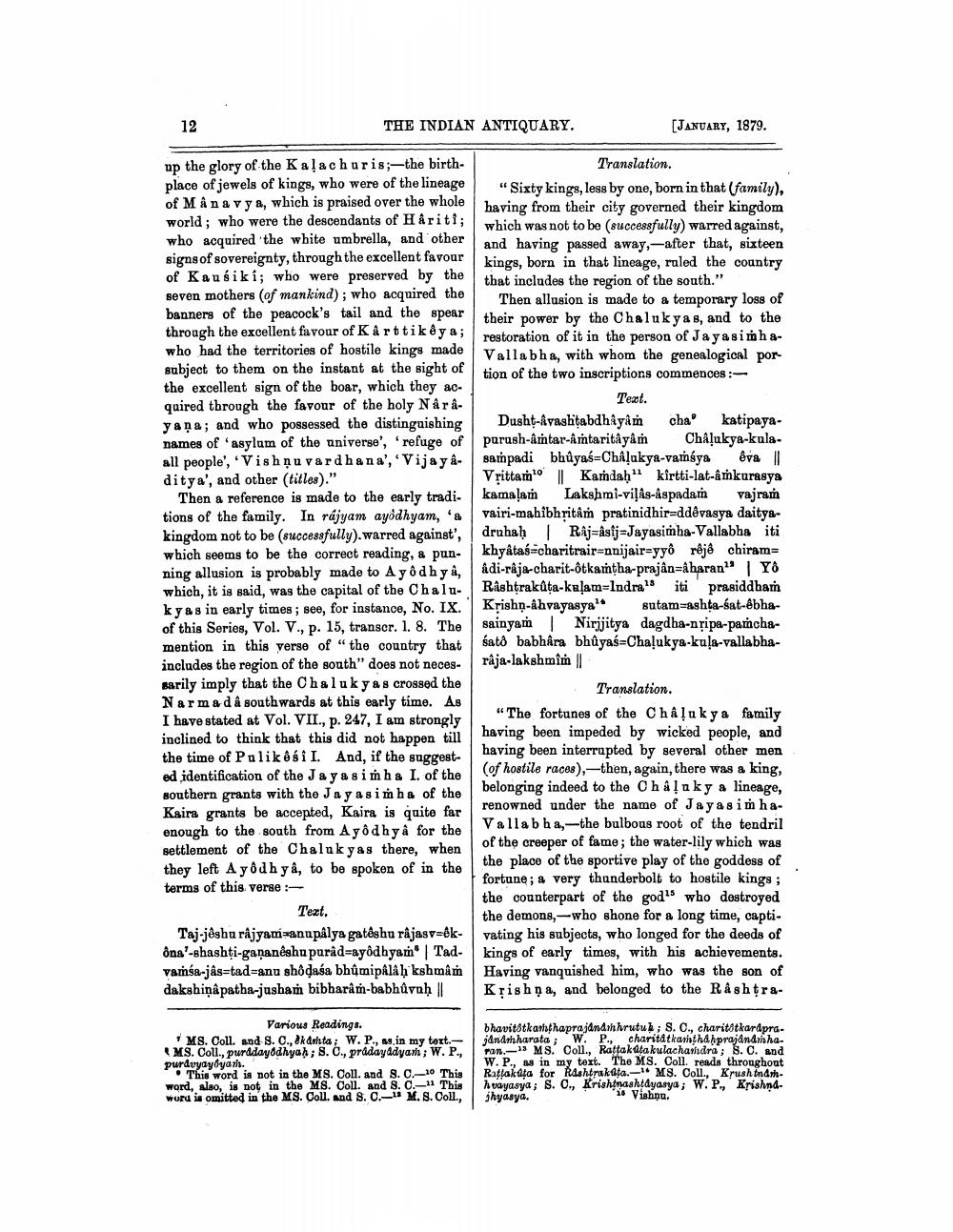________________
12
THE INDIAN ANTIQUARY.
up the glory of the Kalachuris;-the birthplace of jewels of kings, who were of the lineage of M â na vya, which is praised over the whole world; who were the descendants of Hâriti; who acquired the white umbrella, and other signs of sovereignty, through the excellent favour of Kausiki; who were preserved by the seven mothers (of mankind); who acquired the banners of the peacock's tail and the spear through the excellent favour of K ârttikêya; who had the territories of hostile kings made subject to them on the instant at the sight of the excellent sign of the boar, which they acquired through the favour of the holy Nârâyana; and who possessed the distinguishing names of asylum of the universe', 'refuge of all people, Vishnuvardhana', 'Vijayk ditya', and other (titles)."
Then a reference is made to the early traditions of the family. In rájyam ayodhyam, 'a kingdom not to be (successfully).warred against', which seems to be the correct reading, a punning allusion is probably made to Ayodhya, which, it is said, was the capital of the Chalukyas in early times; see, for instance, No. IX. of this Series, Vol. V., p. 15, transer. 1. 8. The mention in this verse of "the country that includes the region of the south" does not necessarily imply that the Chalukyas crossed the Narmada southwards at this early time. As I have stated at Vol. VII., p. 247, I am strongly inclined to think that this did not happen till the time of Pulikês i I. And, if the suggested identification of the Jayasimha I. of the southern grants with the Jayasimha of the Kaira grants be accepted, Kaira is quite far enough to the south from Ayodhya for the settlement of the Chalukyas there, when they left Ayodhya, to be spoken of in the terms of this verse :
Various Readings.
MS. Coll. and S. C., kahta; W. P., as in my text.MS. Coll., puradayodhyaḥ; S. C., pradayadyam; W. P., puravyaybyam.
This word is not in the MS. Coll. and S. C.-10 This word, also, is not in the MS. Coll. and S. C.- This word is omitted in the MS. Coll. and S. C.- M. S. Coll.,
[JANUARY, 1879.
Translation.
"Sixty kings, less by one, born in that (family), having from their city governed their kingdom which was not to be (successfully) warred against, and having passed away,-after that, sixteen kings, born in that lineage, ruled the country that includes the region of the south."
Then allusion is made to a temporary loss of their power by the Chalukyas, and to the restoration of it in the person of JayasimhaVallabha, with whom the genealogical portion of the two inscriptions commences:
Text.
Dasht-irashtabdhiyiṁ purush-âmtar-âmtaritâyâm
cha
katipaya. Chalukya-kalasampadi bhayas-Chalukya-váyn êva || Vrittam Kamdaḥ" kirtti-lat-âmkurasya kamalam Lakshmi-vils-kapada Tajm Tairi-mahibhriti pratinidhir-divasya daityadruhah | Raj-Astj-Jayasimha-Vallabha iti khyâtas-charitrair-nnijair-yyô rêjê chiram= âdi-raja-charit-ôtkamtha-prajân-âharan | Yo Rashtrakuta-kalam-Indra iti prasiddham Krishn-âhvayasya1 sutam-ashta-sat-êbhasainyam Nirjjitya dagdha-nripa-pamchasatô babhara bhûyaś-Chalukya-kula-vallabharâja-lakshmîm ||
Translation.
"The fortunes of the Chalukya family having been impeded by wicked people, and having been interrupted by several other men (of hostile races), then, again, there was a king, belonging indeed to the Chaluky a lineage, renowned under the name of JayasimhaVallabha, the bulbous root of the tendril of the creeper of fame; the water-lily which was the place of the sportive play of the goddess of fortune; a very thunderbolt to hostile kings; the counterpart of the gods who destroyed the demons,-who shone for a long time, capti
Text.
Taj-jêshu rajyam anupalya gatêshu râjasv-êk-vating his subjects, who longed for the deeds of ôna'-shashti-gananêshu purâd-ayodhyam | Tad- kings of early times, with his achievements. vamsa-jas-tad-anu shôḍaśa bhûmipâlâḥ kshmâm Having vanquished him, who was the son of dakshinâ patha-jusham bibharâm-babhuvuḥ || Krishna, and belonged to the Rashtra
bhavitôtkamthaprajanamhrutub; S. C., charitôtkar@prajanamharata; W. P., charitatkamthaḥprajânâmharan.-13 MS. Coll., Rattakatakulachandra; 8. C. and W. P., as in my text. The MS. Coll. reads throughout Rattakata for Rashtrakuta.- MS. Coll., Krush tnamhvayasya; S. C., Krishtnashtayasya; W. P., Krishnajhyasya. is Vishnu.




